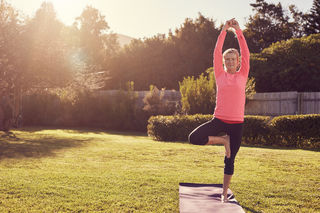Depression
Yoga Helps Reduce Symptoms of Depression, Study Finds
Yoga classes and deep (yogic) breathing help reduce major depressive disorder.
Posted March 4, 2017
.jpg?itok=Mj87kCgW)
Major Depressive Disorder (MDD) is one of the most common mental health disorders in the United States. According to statistics from the National Institute of Mental Health (NIMH), in 2015, an estimated 16.1 million adults aged 18 or older in the U.S. had experienced at least one major depressive episode in the past year. This number represented 6.7 percent of the adult population.
Globally, the World Health Organization (WHO) estimates that major depressive disorder carries the heaviest burden of disability among all mental and behavioral disorders. Unfortunately, almost half of all individuals who use antidepressant medications to treat MDD do not achieve full remission of their depressive symptoms.
But, there is a good news. The National Center for Complementary and Integrative Health (NCCIH) has been funding research to identify nonpharmacological interventions that can help reduce the symptoms of depression, and the latest research findings offer promise.
Twice Weekly Yoga (Plus Home Practice) Reduces Symptoms of Major Depression
Yesterday, researchers from Boston University School of Medicine published a new report showing that people with MDD who participate in yoga and deep (coherent) breathing classes at least twice weekly (plus practicing at home) experience a significant reduction in their depressive symptoms. The March 2017 findings appear in the Journal of Alternative and Complementary Medicine.
In a statement to BUSM, corresponding author Chris Streeter, associate professor of psychiatry and neurology at Boston University School of Medicine and a psychiatrist at Boston Medical Center, explained the neuroscience behind why yoga helps treat MDD:
"While most pharmacologic treatment for depression target monoamine systems, such as serotonin, dopamine and norepinephrine, this intervention targets the parasympathetic and gamma aminobutyric acid system and provides a new avenue for treatment."
Although all types of yoga most likely have psychological benefits, this study used a specialized technique called "lyengar yoga" that puts an emphasis on precise alignment while performing various postures and yogic breathing exercises.

These findings corroborate a November 2016 study from the University of Pennsylvania which concluded that a breathing-based meditation practice known as "Sudarshan Kriya yoga" helped reduce major depressive symptoms in those who had an inadequate response to pharmacological antidepressant treatments.
One of the main goals of the BUSM study was to identify an optimal yoga "dose-response relationship" for future studies on individuals with major depressive disorder. Again, there is good news in this department: You don't need to become a yogi or yogini (who practices yoga for hours a day) to reap the psychological benefits of doing yoga exercises and yogic breathing a few times a week.
In fact, Streeter et al. found that the "low dose" group—who participated in two 90-minute yoga classes a week (plus some home practice)—experienced significant decreases in their depressive symptoms that were on par with the clinical improvements observed in the "high dose" yoga group. In a statement, the BUSM researchers concluded,
"This study supports the use of a yoga and coherent breathing intervention in major depressive disorder in people who are not on antidepressants and in those who have been on a stable dose of antidepressants and have not achieved a resolution of their symptoms."
According to Chris Streeter, one of the main benefits of incorporating yoga as a treatment for depressive disorders is that the combination of pharmacological and/or non-pharmacological interventions has the advantage of avoiding additional drug side effects and drug interactions while improving clinical outcomes.
References
Chris C. Streeter, Patricia L. Gerbarg, Theodore H. Whitfield, Liz Owen, Jennifer Johnston, Marisa M. Silveri, Marysia Gensler, Carol L. Faulkner, Cathy Mann, Mary Wixted, Anne Marie Hernon, Maren B. Nyer, E. Richard P. Brown, John E. Jensen. Treatment of Major Depressive Disorder with Iyengar Yoga and Coherent Breathing: A Randomized Controlled Dosing Study. The Journal of Alternative and Complementary Medicine, 2017; DOI: 10.1089/acm.2016.0140
Anup Sharma, Marna S. Barrett, Andrew J. Cucchiara, Nalaka S. Gooneratne, Michael E. Thase. A Breathing-Based Meditation Intervention for Patients With Major Depressive Disorder Following Inadequate Response to Antidepressants. The Journal of Clinical Psychiatry, 2016; DOI: 10.4088/JCP.16m10819


